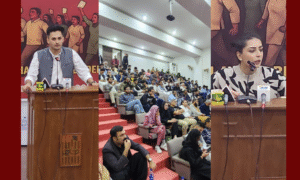Wajid
SINCE the current government was selected ,every one has overheard the term “Deficit”, particularly the current account deficit.
Current Account Deficit is the difference of exports and imports of a country . The current government usually blames the previous two regimes for it, ignoring the fact that his government is responsible for it for two years. In a bizarre turn of events, the government claims that the deficit was shrunk to 1.1% in FY 19-20. The premier seems happy about the shrinking deficit and has declared that the decline of deficit would be a milestone for economic health ,but this claim might be misleading . There is no doubt in the fact that the deficit has reduced, but the question is who gets the privileges and who gets to pay? Is it the marginalised and oppressed or is it those who are in power?
The deficit could be contracted through two ways: First the production of the local good could be increased, by giving incentives to factories , industrial and agricultural sector.
Secondly, by controlling the government officials’ expenses and non combat defence expenditures which will decrease the imports by many times.
What the current government has done is that it banned the raw materials, machineries and goods for industries and production factories rather than giving them incentives, resulting in the loss in industrial sector . Consequently , it has also decreased the imports leading to the narrow deficit. The concerning matter is that, this is a short term policy which could have dreadful consequences . The selected government should have reduced the defence budget, but it didn’t. It has rather uplifted the defence budget by 12 %up-to 1289 billion which is 11.9% of the total budget of FY20-21.
The interesting story is that the current government intends to purchase more defence machinery and aircraft . The premier keeps praising his cabinet for declining the current account deficit, but on the contrary the government keeps increasing the defence budget. Ideally, the deficit shouldn’t be decreased on the price of industrial sector, but that is what happened in Pakistan.
Most importantly, the priority should be the revival of industry instead of reducing the deficit. The revival of industries and factories would be a mile stone to encourage the exports and production. It could also decrease the unemployment and give a medium to circulation of money also an incentive to foreign investors to invest in . The production of local good decreases the market price of goods ultimately declining the inflation. It has a direct affect on GDP leading to economic growth .
In a nutshell, the priority of the government should have been the halted half legged economy rather than just turning around a single variable of the economy which has nothing to do with the poverty , unemployment and income per capita of the nation.
The Students’ Herald News Desk focuses on reporting the latest news regarding student politics and campus updates to you.
The News Desk can be reached at admin@thestudentsherald.com




